Decolonization, Indigenous Communities, and Sociological Perspectives
VerifiedAdded on 2023/01/18
|6
|1481
|45
Essay
AI Summary
This essay delves into the concept of decolonization as experienced by Indigenous communities, emphasizing the reclamation of cultural, spiritual, and economic dominance. It explores how colonization, particularly in Aotearoa New Zealand, has impacted the Maori people, leading to socio-political struggles and the need for decolonization. The essay examines various aspects, including the role of leisure, cultural practices, and the significance of language like te reo in this process. It also addresses the impact of colonization on Maori women, focusing on the concept of Mana Wahine and the fight against gendered violence within a post-colonial context. The analysis incorporates scholarly research to provide a comprehensive overview of the challenges and transformative capacities inherent in decolonization efforts, highlighting the importance of Indigenous perspectives and methodologies for understanding and addressing the legacies of colonialism.
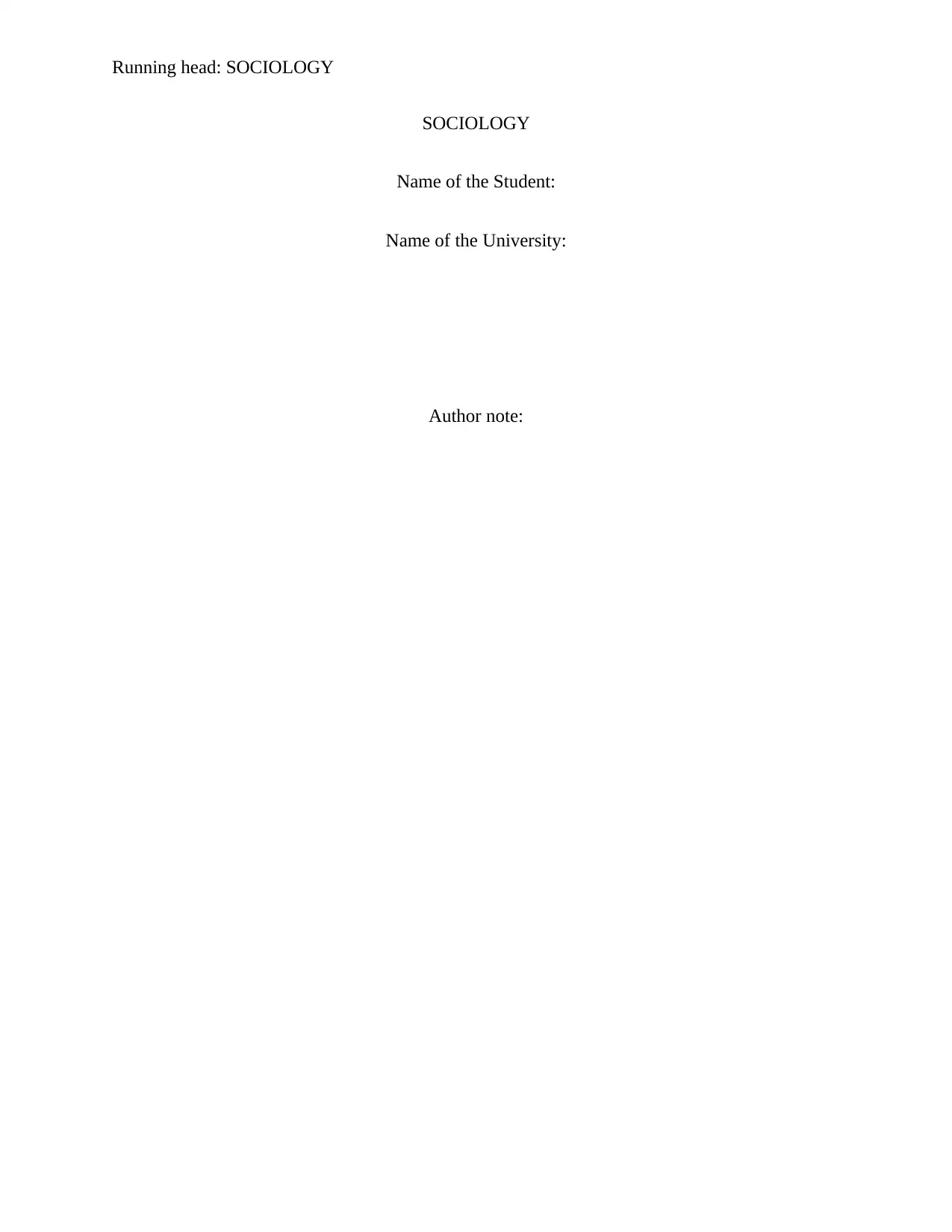
Running head: SOCIOLOGY
SOCIOLOGY
Name of the Student:
Name of the University:
Author note:
SOCIOLOGY
Name of the Student:
Name of the University:
Author note:
Paraphrase This Document
Need a fresh take? Get an instant paraphrase of this document with our AI Paraphraser
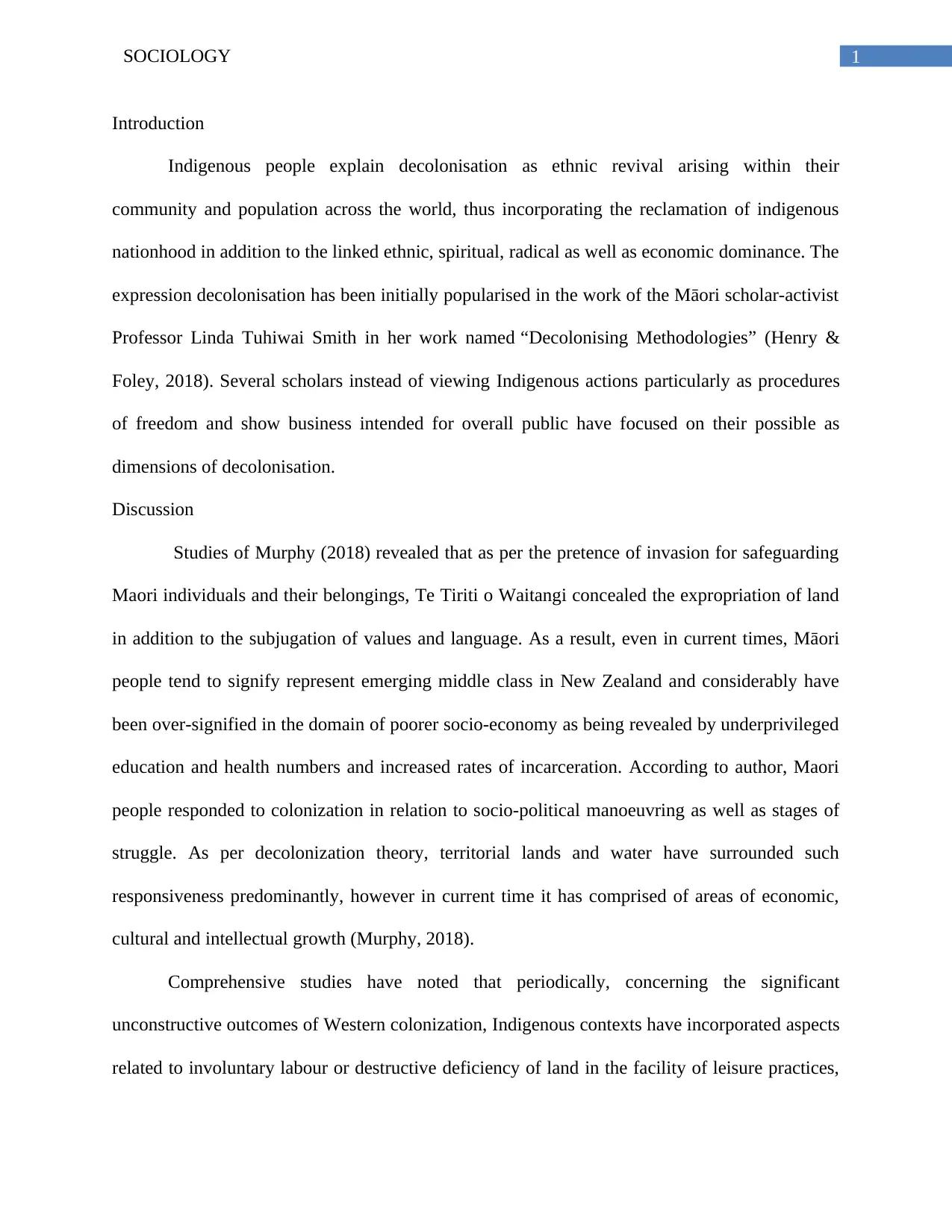
1SOCIOLOGY
Introduction
Indigenous people explain decolonisation as ethnic revival arising within their
community and population across the world, thus incorporating the reclamation of indigenous
nationhood in addition to the linked ethnic, spiritual, radical as well as economic dominance. The
expression decolonisation has been initially popularised in the work of the Māori scholar-activist
Professor Linda Tuhiwai Smith in her work named “Decolonising Methodologies” (Henry &
Foley, 2018). Several scholars instead of viewing Indigenous actions particularly as procedures
of freedom and show business intended for overall public have focused on their possible as
dimensions of decolonisation.
Discussion
Studies of Murphy (2018) revealed that as per the pretence of invasion for safeguarding
Maori individuals and their belongings, Te Tiriti o Waitangi concealed the expropriation of land
in addition to the subjugation of values and language. As a result, even in current times, Māori
people tend to signify represent emerging middle class in New Zealand and considerably have
been over-signified in the domain of poorer socio-economy as being revealed by underprivileged
education and health numbers and increased rates of incarceration. According to author, Maori
people responded to colonization in relation to socio-political manoeuvring as well as stages of
struggle. As per decolonization theory, territorial lands and water have surrounded such
responsiveness predominantly, however in current time it has comprised of areas of economic,
cultural and intellectual growth (Murphy, 2018).
Comprehensive studies have noted that periodically, concerning the significant
unconstructive outcomes of Western colonization, Indigenous contexts have incorporated aspects
related to involuntary labour or destructive deficiency of land in the facility of leisure practices,
Introduction
Indigenous people explain decolonisation as ethnic revival arising within their
community and population across the world, thus incorporating the reclamation of indigenous
nationhood in addition to the linked ethnic, spiritual, radical as well as economic dominance. The
expression decolonisation has been initially popularised in the work of the Māori scholar-activist
Professor Linda Tuhiwai Smith in her work named “Decolonising Methodologies” (Henry &
Foley, 2018). Several scholars instead of viewing Indigenous actions particularly as procedures
of freedom and show business intended for overall public have focused on their possible as
dimensions of decolonisation.
Discussion
Studies of Murphy (2018) revealed that as per the pretence of invasion for safeguarding
Maori individuals and their belongings, Te Tiriti o Waitangi concealed the expropriation of land
in addition to the subjugation of values and language. As a result, even in current times, Māori
people tend to signify represent emerging middle class in New Zealand and considerably have
been over-signified in the domain of poorer socio-economy as being revealed by underprivileged
education and health numbers and increased rates of incarceration. According to author, Maori
people responded to colonization in relation to socio-political manoeuvring as well as stages of
struggle. As per decolonization theory, territorial lands and water have surrounded such
responsiveness predominantly, however in current time it has comprised of areas of economic,
cultural and intellectual growth (Murphy, 2018).
Comprehensive studies have noted that periodically, concerning the significant
unconstructive outcomes of Western colonization, Indigenous contexts have incorporated aspects
related to involuntary labour or destructive deficiency of land in the facility of leisure practices,
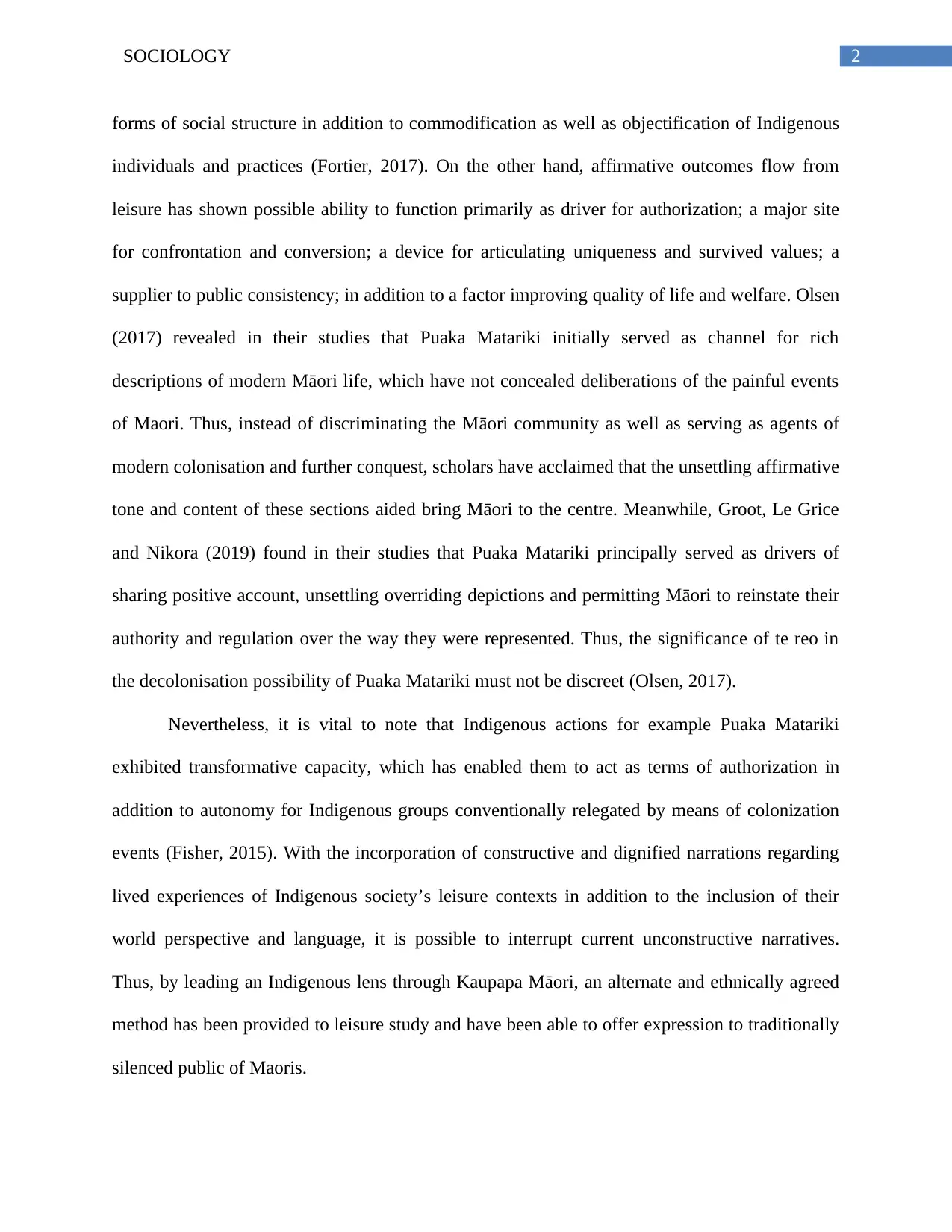
2SOCIOLOGY
forms of social structure in addition to commodification as well as objectification of Indigenous
individuals and practices (Fortier, 2017). On the other hand, affirmative outcomes flow from
leisure has shown possible ability to function primarily as driver for authorization; a major site
for confrontation and conversion; a device for articulating uniqueness and survived values; a
supplier to public consistency; in addition to a factor improving quality of life and welfare. Olsen
(2017) revealed in their studies that Puaka Matariki initially served as channel for rich
descriptions of modern Māori life, which have not concealed deliberations of the painful events
of Maori. Thus, instead of discriminating the Māori community as well as serving as agents of
modern colonisation and further conquest, scholars have acclaimed that the unsettling affirmative
tone and content of these sections aided bring Māori to the centre. Meanwhile, Groot, Le Grice
and Nikora (2019) found in their studies that Puaka Matariki principally served as drivers of
sharing positive account, unsettling overriding depictions and permitting Māori to reinstate their
authority and regulation over the way they were represented. Thus, the significance of te reo in
the decolonisation possibility of Puaka Matariki must not be discreet (Olsen, 2017).
Nevertheless, it is vital to note that Indigenous actions for example Puaka Matariki
exhibited transformative capacity, which has enabled them to act as terms of authorization in
addition to autonomy for Indigenous groups conventionally relegated by means of colonization
events (Fisher, 2015). With the incorporation of constructive and dignified narrations regarding
lived experiences of Indigenous society’s leisure contexts in addition to the inclusion of their
world perspective and language, it is possible to interrupt current unconstructive narratives.
Thus, by leading an Indigenous lens through Kaupapa Māori, an alternate and ethnically agreed
method has been provided to leisure study and have been able to offer expression to traditionally
silenced public of Maoris.
forms of social structure in addition to commodification as well as objectification of Indigenous
individuals and practices (Fortier, 2017). On the other hand, affirmative outcomes flow from
leisure has shown possible ability to function primarily as driver for authorization; a major site
for confrontation and conversion; a device for articulating uniqueness and survived values; a
supplier to public consistency; in addition to a factor improving quality of life and welfare. Olsen
(2017) revealed in their studies that Puaka Matariki initially served as channel for rich
descriptions of modern Māori life, which have not concealed deliberations of the painful events
of Maori. Thus, instead of discriminating the Māori community as well as serving as agents of
modern colonisation and further conquest, scholars have acclaimed that the unsettling affirmative
tone and content of these sections aided bring Māori to the centre. Meanwhile, Groot, Le Grice
and Nikora (2019) found in their studies that Puaka Matariki principally served as drivers of
sharing positive account, unsettling overriding depictions and permitting Māori to reinstate their
authority and regulation over the way they were represented. Thus, the significance of te reo in
the decolonisation possibility of Puaka Matariki must not be discreet (Olsen, 2017).
Nevertheless, it is vital to note that Indigenous actions for example Puaka Matariki
exhibited transformative capacity, which has enabled them to act as terms of authorization in
addition to autonomy for Indigenous groups conventionally relegated by means of colonization
events (Fisher, 2015). With the incorporation of constructive and dignified narrations regarding
lived experiences of Indigenous society’s leisure contexts in addition to the inclusion of their
world perspective and language, it is possible to interrupt current unconstructive narratives.
Thus, by leading an Indigenous lens through Kaupapa Māori, an alternate and ethnically agreed
method has been provided to leisure study and have been able to offer expression to traditionally
silenced public of Maoris.
⊘ This is a preview!⊘
Do you want full access?
Subscribe today to unlock all pages.

Trusted by 1+ million students worldwide
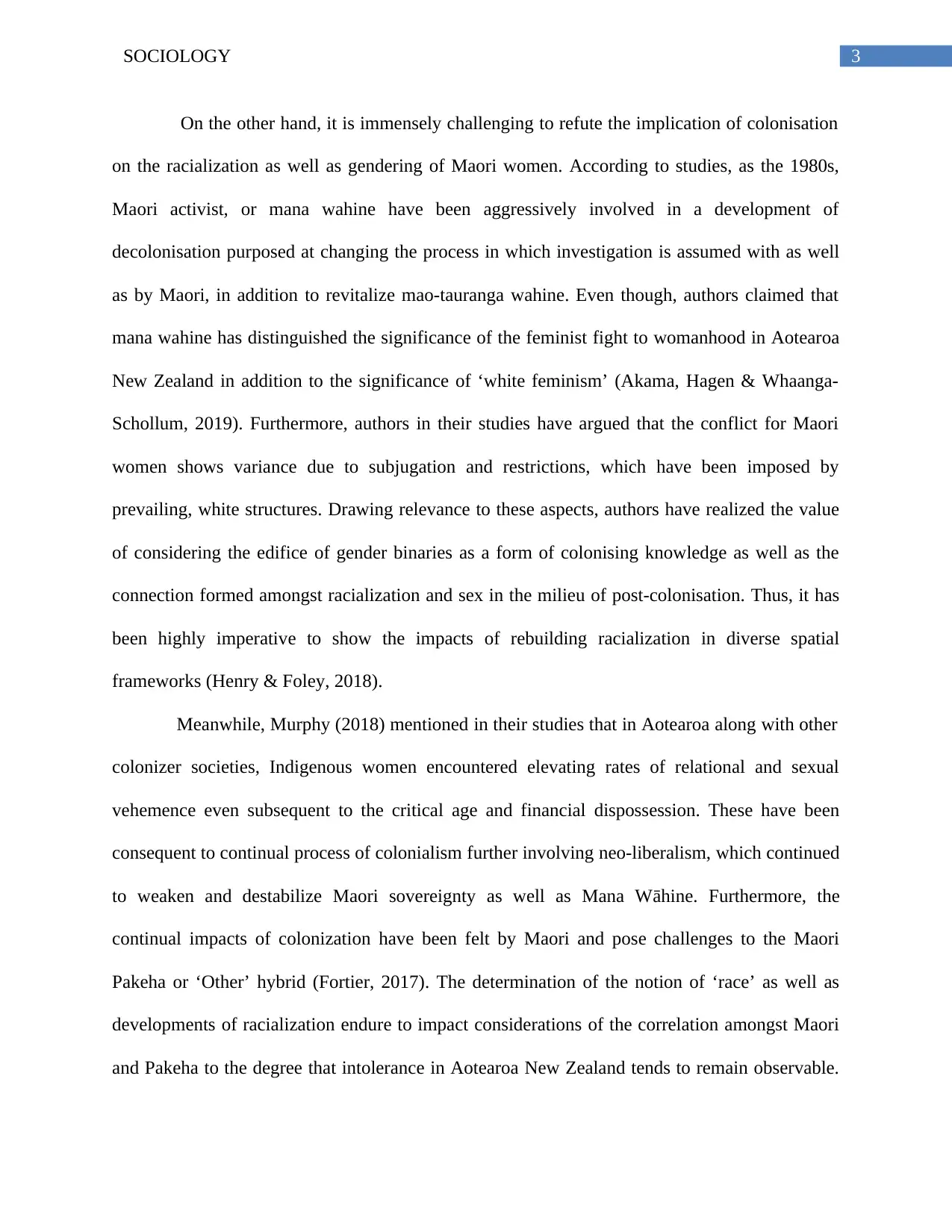
3SOCIOLOGY
On the other hand, it is immensely challenging to refute the implication of colonisation
on the racialization as well as gendering of Maori women. According to studies, as the 1980s,
Maori activist, or mana wahine have been aggressively involved in a development of
decolonisation purposed at changing the process in which investigation is assumed with as well
as by Maori, in addition to revitalize mao-tauranga wahine. Even though, authors claimed that
mana wahine has distinguished the significance of the feminist fight to womanhood in Aotearoa
New Zealand in addition to the significance of ‘white feminism’ (Akama, Hagen & Whaanga-
Schollum, 2019). Furthermore, authors in their studies have argued that the conflict for Maori
women shows variance due to subjugation and restrictions, which have been imposed by
prevailing, white structures. Drawing relevance to these aspects, authors have realized the value
of considering the edifice of gender binaries as a form of colonising knowledge as well as the
connection formed amongst racialization and sex in the milieu of post-colonisation. Thus, it has
been highly imperative to show the impacts of rebuilding racialization in diverse spatial
frameworks (Henry & Foley, 2018).
Meanwhile, Murphy (2018) mentioned in their studies that in Aotearoa along with other
colonizer societies, Indigenous women encountered elevating rates of relational and sexual
vehemence even subsequent to the critical age and financial dispossession. These have been
consequent to continual process of colonialism further involving neo-liberalism, which continued
to weaken and destabilize Maori sovereignty as well as Mana Wāhine. Furthermore, the
continual impacts of colonization have been felt by Maori and pose challenges to the Maori
Pakeha or ‘Other’ hybrid (Fortier, 2017). The determination of the notion of ‘race’ as well as
developments of racialization endure to impact considerations of the correlation amongst Maori
and Pakeha to the degree that intolerance in Aotearoa New Zealand tends to remain observable.
On the other hand, it is immensely challenging to refute the implication of colonisation
on the racialization as well as gendering of Maori women. According to studies, as the 1980s,
Maori activist, or mana wahine have been aggressively involved in a development of
decolonisation purposed at changing the process in which investigation is assumed with as well
as by Maori, in addition to revitalize mao-tauranga wahine. Even though, authors claimed that
mana wahine has distinguished the significance of the feminist fight to womanhood in Aotearoa
New Zealand in addition to the significance of ‘white feminism’ (Akama, Hagen & Whaanga-
Schollum, 2019). Furthermore, authors in their studies have argued that the conflict for Maori
women shows variance due to subjugation and restrictions, which have been imposed by
prevailing, white structures. Drawing relevance to these aspects, authors have realized the value
of considering the edifice of gender binaries as a form of colonising knowledge as well as the
connection formed amongst racialization and sex in the milieu of post-colonisation. Thus, it has
been highly imperative to show the impacts of rebuilding racialization in diverse spatial
frameworks (Henry & Foley, 2018).
Meanwhile, Murphy (2018) mentioned in their studies that in Aotearoa along with other
colonizer societies, Indigenous women encountered elevating rates of relational and sexual
vehemence even subsequent to the critical age and financial dispossession. These have been
consequent to continual process of colonialism further involving neo-liberalism, which continued
to weaken and destabilize Maori sovereignty as well as Mana Wāhine. Furthermore, the
continual impacts of colonization have been felt by Maori and pose challenges to the Maori
Pakeha or ‘Other’ hybrid (Fortier, 2017). The determination of the notion of ‘race’ as well as
developments of racialization endure to impact considerations of the correlation amongst Maori
and Pakeha to the degree that intolerance in Aotearoa New Zealand tends to remain observable.
Paraphrase This Document
Need a fresh take? Get an instant paraphrase of this document with our AI Paraphraser
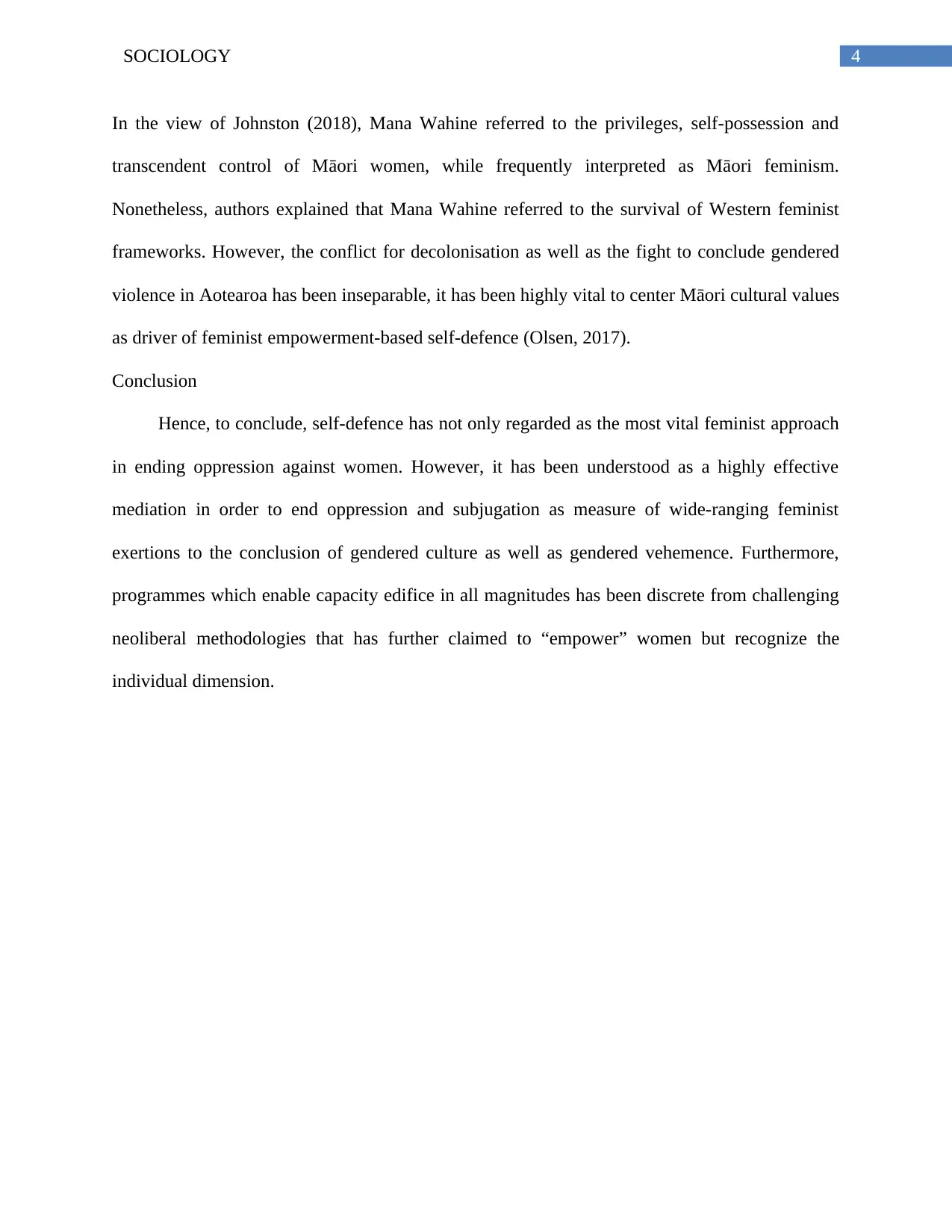
4SOCIOLOGY
In the view of Johnston (2018), Mana Wahine referred to the privileges, self-possession and
transcendent control of Māori women, while frequently interpreted as Māori feminism.
Nonetheless, authors explained that Mana Wahine referred to the survival of Western feminist
frameworks. However, the conflict for decolonisation as well as the fight to conclude gendered
violence in Aotearoa has been inseparable, it has been highly vital to center Māori cultural values
as driver of feminist empowerment-based self-defence (Olsen, 2017).
Conclusion
Hence, to conclude, self-defence has not only regarded as the most vital feminist approach
in ending oppression against women. However, it has been understood as a highly effective
mediation in order to end oppression and subjugation as measure of wide-ranging feminist
exertions to the conclusion of gendered culture as well as gendered vehemence. Furthermore,
programmes which enable capacity edifice in all magnitudes has been discrete from challenging
neoliberal methodologies that has further claimed to “empower” women but recognize the
individual dimension.
In the view of Johnston (2018), Mana Wahine referred to the privileges, self-possession and
transcendent control of Māori women, while frequently interpreted as Māori feminism.
Nonetheless, authors explained that Mana Wahine referred to the survival of Western feminist
frameworks. However, the conflict for decolonisation as well as the fight to conclude gendered
violence in Aotearoa has been inseparable, it has been highly vital to center Māori cultural values
as driver of feminist empowerment-based self-defence (Olsen, 2017).
Conclusion
Hence, to conclude, self-defence has not only regarded as the most vital feminist approach
in ending oppression against women. However, it has been understood as a highly effective
mediation in order to end oppression and subjugation as measure of wide-ranging feminist
exertions to the conclusion of gendered culture as well as gendered vehemence. Furthermore,
programmes which enable capacity edifice in all magnitudes has been discrete from challenging
neoliberal methodologies that has further claimed to “empower” women but recognize the
individual dimension.
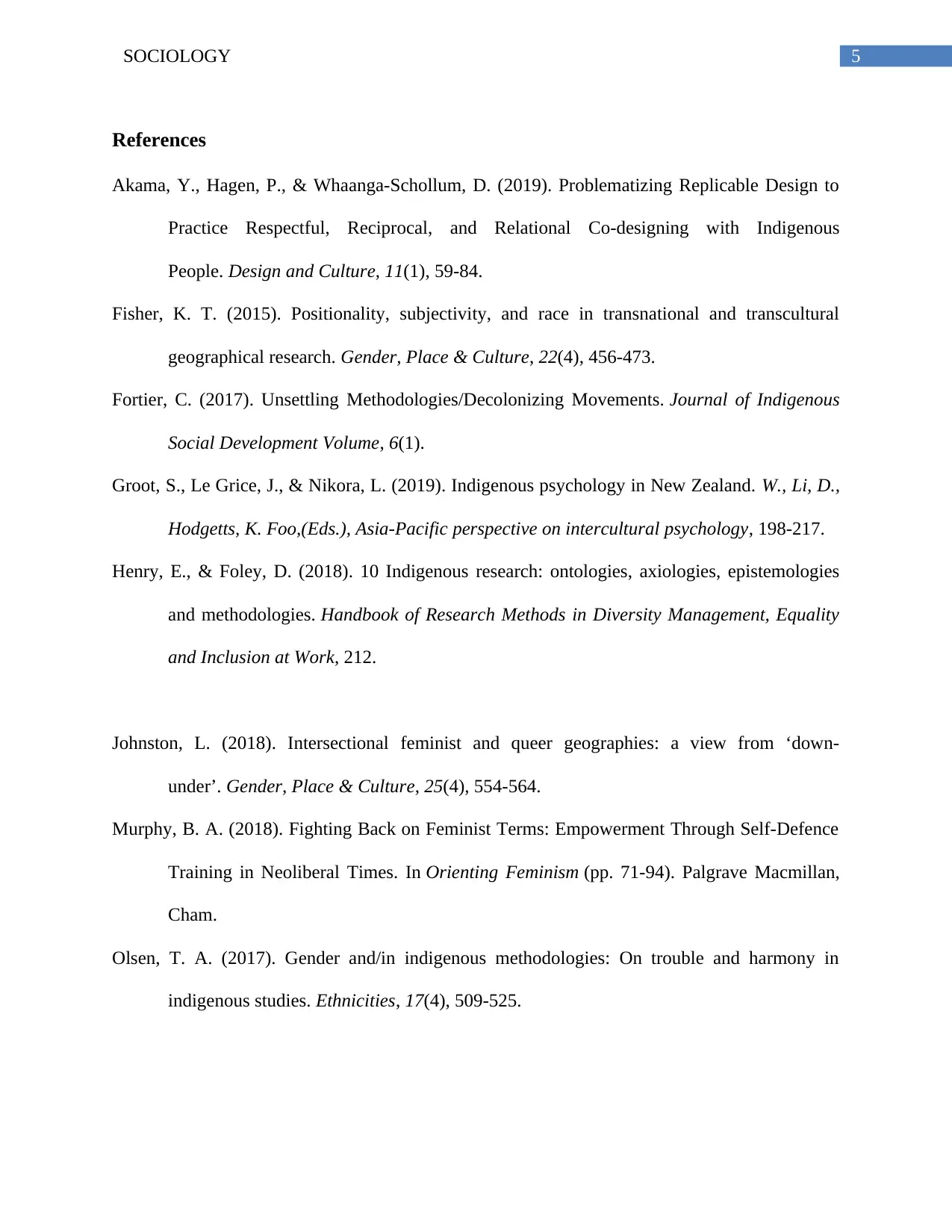
5SOCIOLOGY
References
Akama, Y., Hagen, P., & Whaanga-Schollum, D. (2019). Problematizing Replicable Design to
Practice Respectful, Reciprocal, and Relational Co-designing with Indigenous
People. Design and Culture, 11(1), 59-84.
Fisher, K. T. (2015). Positionality, subjectivity, and race in transnational and transcultural
geographical research. Gender, Place & Culture, 22(4), 456-473.
Fortier, C. (2017). Unsettling Methodologies/Decolonizing Movements. Journal of Indigenous
Social Development Volume, 6(1).
Groot, S., Le Grice, J., & Nikora, L. (2019). Indigenous psychology in New Zealand. W., Li, D.,
Hodgetts, K. Foo,(Eds.), Asia-Pacific perspective on intercultural psychology, 198-217.
Henry, E., & Foley, D. (2018). 10 Indigenous research: ontologies, axiologies, epistemologies
and methodologies. Handbook of Research Methods in Diversity Management, Equality
and Inclusion at Work, 212.
Johnston, L. (2018). Intersectional feminist and queer geographies: a view from ‘down-
under’. Gender, Place & Culture, 25(4), 554-564.
Murphy, B. A. (2018). Fighting Back on Feminist Terms: Empowerment Through Self-Defence
Training in Neoliberal Times. In Orienting Feminism (pp. 71-94). Palgrave Macmillan,
Cham.
Olsen, T. A. (2017). Gender and/in indigenous methodologies: On trouble and harmony in
indigenous studies. Ethnicities, 17(4), 509-525.
References
Akama, Y., Hagen, P., & Whaanga-Schollum, D. (2019). Problematizing Replicable Design to
Practice Respectful, Reciprocal, and Relational Co-designing with Indigenous
People. Design and Culture, 11(1), 59-84.
Fisher, K. T. (2015). Positionality, subjectivity, and race in transnational and transcultural
geographical research. Gender, Place & Culture, 22(4), 456-473.
Fortier, C. (2017). Unsettling Methodologies/Decolonizing Movements. Journal of Indigenous
Social Development Volume, 6(1).
Groot, S., Le Grice, J., & Nikora, L. (2019). Indigenous psychology in New Zealand. W., Li, D.,
Hodgetts, K. Foo,(Eds.), Asia-Pacific perspective on intercultural psychology, 198-217.
Henry, E., & Foley, D. (2018). 10 Indigenous research: ontologies, axiologies, epistemologies
and methodologies. Handbook of Research Methods in Diversity Management, Equality
and Inclusion at Work, 212.
Johnston, L. (2018). Intersectional feminist and queer geographies: a view from ‘down-
under’. Gender, Place & Culture, 25(4), 554-564.
Murphy, B. A. (2018). Fighting Back on Feminist Terms: Empowerment Through Self-Defence
Training in Neoliberal Times. In Orienting Feminism (pp. 71-94). Palgrave Macmillan,
Cham.
Olsen, T. A. (2017). Gender and/in indigenous methodologies: On trouble and harmony in
indigenous studies. Ethnicities, 17(4), 509-525.
⊘ This is a preview!⊘
Do you want full access?
Subscribe today to unlock all pages.

Trusted by 1+ million students worldwide
1 out of 6
Your All-in-One AI-Powered Toolkit for Academic Success.
+13062052269
info@desklib.com
Available 24*7 on WhatsApp / Email
![[object Object]](/_next/static/media/star-bottom.7253800d.svg)
Unlock your academic potential
Copyright © 2020–2026 A2Z Services. All Rights Reserved. Developed and managed by ZUCOL.